- Home
- Joel C. Rosenberg
The Third Target: A J. B. Collins Novel
The Third Target: A J. B. Collins Novel Read online
PRAISE FOR JOEL C. ROSENBERG
“Whenever I see a new Joel Rosenberg book coming out, I know I need to clear time on my calendar. His penetrating knowledge of all things Mideastern, coupled with his intuitive knack for high-stakes intrigue, demand attention.”
PORTER GOSS
Former Director of the Central Intelligence Agency
“Joel has an incredible ability to write both fiction and nonfiction regarding the realities of current events in the Mideast in a way that the reader senses that they are part of the plot and, often, on the front line.”
LT. GENERAL (RET.) JERRY BOYKIN
Former Commander of Delta Force and Former U.S. Deputy Undersecretary of Defense for Intelligence
“Joel Rosenberg is one of the most knowledgeable people writing about the Middle East that I’ve had the honor to meet. He has a particularly clear understanding of what is going on in today’s Iran and Syria and the grave threat these two countries pose to the rest of the world. His is an important voice in a sea of misdirected and erroneous information that distorts the truth about the realities of these countries’ intentions.”
REZA KAHLILI
Former CIA Operative in Iran and Bestselling Author of A Time to Betray: A Gripping True Spy Story of Betrayal, Fear, and Courage
“If there were a Forbes 400 list of great current novelists, Joel Rosenberg would be among the top ten. . . . He is one of the most entertaining and intriguing authors of international political thrillers in the country. No wonder Joel has sold over three million copies—his novels are un-put-downable.”
STEVE FORBES
Editor in Chief, Forbes Magazine
Visit Tyndale online at www.tyndale.com.
Visit Joel C. Rosenberg’s website at www.joelrosenberg.com.
TYNDALE and Tyndale’s quill logo are registered trademarks of Tyndale House Publishers, Inc.
The Third Target
Copyright © 2015 by Joel C. Rosenberg. All rights reserved.
Cover photograph of bullet holes copyright © Caspar Benson/Getty Images. All rights reserved.
Cover photograph of flag copyright © RonTech2000/Getty Images. All rights reserved.
Designed by Dean H. Renninger
Scripture quotations in chapter 51 are taken from The Living Bible, copyright © 1971 by Tyndale House Foundation. Used by permission of Tyndale House Publishers, Inc., Carol Stream, Illinois 60188. All rights reserved.
Scripture quotations in the dedication and in chapters 46 and 47 are taken from the New American Standard Bible,® copyright © 1960, 1962, 1963, 1968, 1971, 1972, 1973, 1975, 1977, 1995 by The Lockman Foundation. Used by permission.
Scripture quotations in chapter 37 are taken from The Holy Bible, English Standard Version® (ESV®), copyright © 2001 by Crossway, a publishing ministry of Good News Publishers. Used by permission. All rights reserved.
The Third Target is a work of fiction. Where real people, events, establishments, organizations, or locales appear, they are used fictitiously. All other elements of the novel are drawn from the author’s imagination.
Library of Congress Cataloging-in-Publication Data
Rosenberg, Joel C., date.
The third target / Joel C. Rosenberg.
pages cm
ISBN 978-1-4143-3627-5 (hc)
1. Terrorism—Fiction. 2. Middle East—Fiction. 3. Christian fiction. 4. Suspense fiction. I. Title.
PS3618.O832T48 2014
813'.6—dc23 2014040246
ISBN 978-1-4964-0367-4 (ePub); ISBN 978-1-4143-8495-5 (Kindle); ISBN 978-1-4964-0368-1 (Apple)
Build: 2015-01-16 10:26:11
To our son Jonah, whose very name reminds us each and every day that God not only loves Israel, but also greatly loves her neighbors and her enemies.
“You are a gracious and compassionate God, slow to anger and abundant in lovingkindness, and one who relents concerning calamity.”
JONAH 4:2
CONTENTS
Cast of Characters
Part One: July 20, 1951 Chapter 1
Chapter 2
Chapter 3
Chapter 4
Chapter 5
Part Two: Present Day Chapter 6
Chapter 7
Chapter 8
Chapter 9
Chapter 10
Chapter 11
Chapter 12
Chapter 13
Chapter 14
Chapter 15
Chapter 16
Part Three Chapter 17
Chapter 18
Chapter 19
Chapter 20
Chapter 21
Chapter 22
Part Four Chapter 23
Chapter 24
Chapter 25
Chapter 26
Chapter 27
Chapter 28
Chapter 29
Chapter 30
Chapter 31
Chapter 32
Part Five Chapter 33
Chapter 34
Chapter 35
Chapter 36
Chapter 37
Chapter 38
Chapter 39
Chapter 40
Chapter 41
Chapter 42
Chapter 43
Chapter 44
Part Six Chapter 45
Chapter 46
Chapter 47
Chapter 48
Chapter 49
Chapter 50
Chapter 51
Chapter 52
Chapter 53
Chapter 54
Chapter 55
Chapter 56
Chapter 57
Chapter 58
Chapter 59
Chapter 60
Chapter 61
Chapter 62
Chapter 63
Chapter 64
About the Author
A Note from the Author
CAST OF CHARACTERS
JOURNALISTS
J. B. Collins—foreign correspondent for the New York Times
Allen MacDonald—foreign editor for the New York Times
Omar Fayez—Amman-based reporter for the New York Times
Abdel Hamid—Beirut-based photographer for the New York Times
Alex Brunnell—Jerusalem bureau chief for the New York Times
A. B. Collins—former Cairo bureau chief for the Associated Press, and J. B.’s grandfather
AMERICANS
Harrison Taylor—president of the United States
Jack Vaughn—director of the Central Intelligence Agency
Robert Khachigian—former director of the CIA
Arthur Harris—special agent with the Federal Bureau of Investigation
Matthew Collins—J. B.’s older brother
JORDANIANS
King Abdullah II—the monarch of the Hashemite Kingdom of Jordan
Prince Marwan Talal—uncle of the king of Jordan and a senior advisor
Kamal Jeddeh—director of Jordanian intelligence (Mukhabarat)
Ali Sa’id—chief of security for the Royal Court
TERRORISTS
Abu Khalif—leader of the Islamic State in Iraq and al-Sham (ISIS)
Jamal Ramzy—commander of ISIS rebel forces in Syria and cousin of Abu Khalif
Tariq Baqouba—deputy to Jamal Ramzy
Faisal Baqouba—ISIS terrorist and brother of Tariq
IRAQIS
Hassan Karbouli—Iraqi minister of the interior
Ismail Tikriti—deputy director of Iraqi intelligence
ISRAELIS
Daniel Lavi—Israeli prime minister
Ari Shalit—deputy director of the Mossad
Yael Katzir—Mossad agent
PALESTINIANS
>
Salim Mansour—president of the Palestinian Authority
Youssef Kuttab—senior aide to President Mansour
1
JERUSALEM
I had never met a king before.
Forty-eight hours earlier, I received a summons from the palace to meet with His Majesty at a certain time in a certain place for an exceedingly rare interview with a foreign journalist. But now I was late, and I was petrified.
Sweat dripped down my face and inside the back of my shirt. As the sun blazed in the eastern sky, the cool of the morning was a distant memory. My freshly starched white collar was rapidly wilting. My crisply knotted azure tie was starting to feel like a noose around my perspiring neck.
I glanced at my gold pocket watch, a graduation present from my father, and the knots in my stomach tightened further. I pulled an already-damp handkerchief from the pocket of my navy-blue pin-striped suit jacket, yet no matter how much I swiped at my brow, I knew it was a losing battle. It wasn’t simply the sultry morning air that weighed heavy upon me. It was the nausea-inducing knowledge—indeed, the rapidly increasing certainty—that I was going to be late for this appointment and blow the most important moment of my career.
I had been requesting this interview for the better part of a year and had been repeatedly rebuffed. Then, without warning, I received a telegram from the palace inviting me, A. B. Collins of the Associated Press, to come to Jerusalem and granting me an exclusive interview without limits or preconditions. I cabled my editors back in New York. They were ecstatic. I was ecstatic. For months I had been reading everything I could about this intriguing, if elusive, monarch. I watched every bit of newsreel footage I could scrounge up. I called or met with every expert I could find who knew him or had met him or could give me any tidbit of insight into who he really was, what he wanted, and where he was headed next.
Now the moment had come. I had been instructed to meet His Majesty King Abdullah bin al-Hussein, ruler of the Hashemite Kingdom of Jordan, at the entrance to the Dome of the Rock precisely at noon. That was in less than ten minutes, and at this rate I was never going to make it.
“Faster, man—can’t you go any faster?” I yelled at my driver.
Leaning forward from the backseat, I pointed through the dust-smudged front window of the cramped little taxi that stank of stale cigarettes. It was an exercise in futility; the answer was pitifully obvious. No, he could not go any faster. It was a Friday. It was the holiest day of the week for the Moslems, and it was fast approaching high noon. Everyone and his cousin were heading to the Al-Aksa Mosque for prayer. It had been this way for twelve centuries, and it would always be thus. No one was going to make an exception—not for a foreigner, not for a Westerner, and certainly not for a reporter.
We were less than a hundred yards from the Damascus Gate, the nearest entrance into the Old City, but traffic was barely moving at all. I surveyed the scene before me and quickly considered my options. Ahead was a classic snapshot of the Orient I had come to know as a foreign correspondent for the Associated Press—a dizzying mélange of vibrant colors and pungent odors and exotic architecture and intriguing faces straight out of central casting. I had seen it in Cairo and Casablanca, in Baghdad and Beirut. Shopkeepers and street vendors who moments before had been brewing coffee and roasting peanuts and hawking everything from spices and kitchen supplies to bottles of Coca-Cola and religious trinkets for the pilgrims were now hurriedly shutting down for the day. Every taxi and truck and private car on the planet seemed to have converged on one traffic circle, their drivers honking their horns and yelling at one another, desperate to get home and then to the mosque. A siren wailed from the south—a police car perhaps, or maybe an ambulance—but it would never get through. A hapless constable sporting a dusty olive-green Royal Jordanian uniform was blowing on a whistle he held in one hand while pointing a wooden club with the other. He shouted commands, but no one paid him much mind.
Bearded, sun-drenched older men, their heads wrapped in white- and black-checkered kaffiyehs, pushed carts of fresh fruits and vegetables as quickly as they could through the filthy, unswept streets while others led goats and camels through tiny gaps in the traffic, back to whatever barns or stables they were usually kept in. Boys in their late teens and young twenties with no jobs and nothing better to do and without fathers or grandfathers in sight seemed in no hurry to get to prayer, taking their last drags on their cigarettes. They stared at giggling packs of young schoolgirls scurrying past with eyes down while older women in long robes and headscarves scowled disapprovingly as they rushed home with boxes of food or pots of water on their heads.
Suddenly the muezzin’s haunting call to prayer began to blare from the loudspeakers mounted high up on the minarets. My heart nearly stopped. I was out of time and out of options.
I was going to have to run for it. It was my only chance.
I shouted over the din for my driver to let me out, tossed a few dinars his way, grabbed my leather satchel, donned my black fedora, and raced down the stone steps toward the crush of people flooding through the gate, jostling past the faithful without shame, though I knew my prospects were grim.
I was supposed to meet His Majesty on the Temple Mount, what the Arabs called “al-Haram ash-Sharif”—the place of the Noble Sanctuary. After countless phone calls and telegrams from my office in Beirut to the press office in the palace in Amman, it had all been arranged. The most beleaguered and endangered monarch in the entire Moslem world would allow me to shadow him for the day and then sit down with him for his first interview with a Western journalist since a rash of assassinations had set the region on edge.
I couldn’t be late. The chief of the Royal Court would never forgive me. He had insisted I get there early. He had promised one of his servants would be waiting. But now they all might be gone by the time I arrived.
I pushed my way through the crowd, a nearly impossible feat, but after considerable difficulty, I finally cleared through the massive stone archway and was inside the Old City. Still ahead of me, however, was a throng of people pressing forward to the mosque.
But I had been here numerous times as a war correspondent in ’48 and ’49, and I had actually come to know these streets well. I decided to gamble.
Rather than head straight into the shuq and up one of the two main streets toward the mosque, already clogged with thousands of worshipers, I moved left, stepped into a pharmacy, and before the owner could even yell at me, I was through the shop and out the back door. Breaking into a full run, I raced through a labyrinthine series of narrow side streets and alleyways, aiming for St. Stephen’s Gate—also known as the Lions’ Gate—and desperately trying to make up for lost time.
As I neared my destination, however, I found that everything had come to a standstill. I could finally see the large green wooden doors that were the gateway to the epicenter of the epicenter, the entrance to the thirty-seven-acre plot upon which the third-holiest site in Islam was situated. I was so close now, but no one was moving forward. Not a soul. And soon I saw why.
A contingent of Jordanian soldiers blocked the way. People were yelling, demanding to be let in for prayer. But the grim-faced, heavily armed young men were having none of it. They had their orders, they shouted back. No one could enter until they received the “all clear” sign.
I was stuck, and like the crowd, I was furious. But I knew something they did not. The king was coming. He was heading to the Al-Aksa Mosque for the noon prayers, surrounded by bodyguards who feared for his life, and for good reason.
2
I set my jaw and pressed forward.
With my press credentials and telegram from the palace in hand, I was certain the soldiers would let me through. But first I had to get to them. The problem was that everyone was pushing forward. Everyone wanted to be at the head of the line. They were shouting at the soldiers to let them get to the mosque on time, and the more resistance they got from the guards, the more infuriated they became.
&nbs
p; “Get back!” someone yelled at me.
“Who do you think you are?” another shouted.
Then a burly man with crooked teeth and hatred in his eyes screamed at me, “Kafir!”
I recoiled in shock. Kafir was an incendiary word. In colloquial Arabic, it technically meant “unbeliever” or “unclean.” But on the street it meant “infidel.” There were few things worse you could call a man in this part of the world—especially a foreigner—and upon hearing it, I instinctively took several steps back. To be branded a kafir was a worst-case scenario. In a crowd already on edge, the term could spark a full-fledged riot, one I would not likely survive. I doubted even the soldiers could guarantee my safety if this crowd turned on me.
There had to be another way. I glanced at my pocket watch again and cursed myself for not having thought my plan through more carefully.
Moving away from the thick of the crowd, I backed into a corner and leaned against a stone wall, watching the raw emotions spiking around me. I could see the young soldiers growing edgy. This had all the makings of a mob. It wouldn’t take much for the situation to devolve into violence. The armed military men—the oldest of them no more than nineteen or twenty, I would guess—braced themselves for a fight while I wiped perspiration from my brow. The scorching sun overhead was beating down on us all. The crush of people and the brutal heat began to conspire to make me feel claustrophobic. I couldn’t believe what was happening. I wasn’t just going to be late; I was actually going to miss this meeting altogether. My career was about to go into the tank. I was beside myself. I had to get out. I had to get some air, something to drink. But there was nothing I could do. Not yet. Not here. All I could do was wait and pray for the winds to shift and my luck to change.

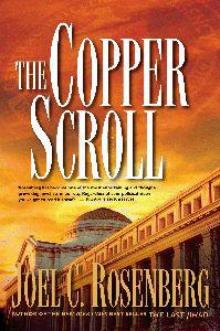 The Copper Scroll
The Copper Scroll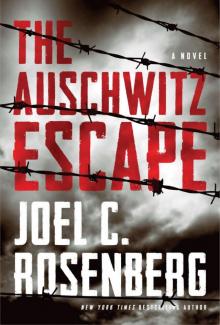 The Auschwitz Escape
The Auschwitz Escape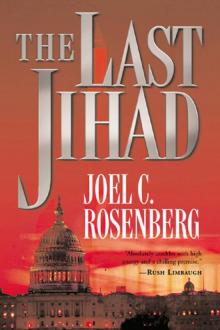 The Last Jihad
The Last Jihad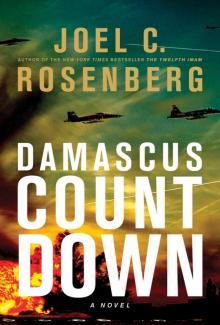 Damascus Countdown
Damascus Countdown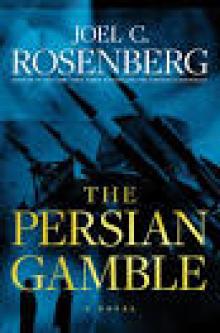 The Persian Gamble
The Persian Gamble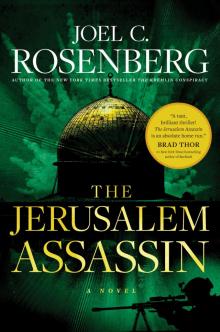 The Jerusalem Assassin
The Jerusalem Assassin Dead Heat
Dead Heat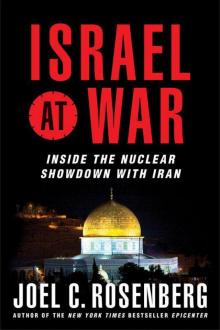 Israel at War: Inside the Nuclear Showdown With Iran
Israel at War: Inside the Nuclear Showdown With Iran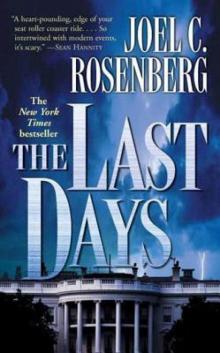 The Last Days
The Last Days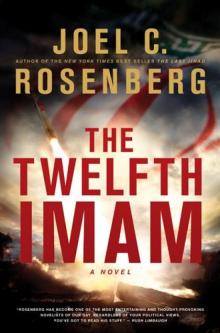 The Twelfth Imam
The Twelfth Imam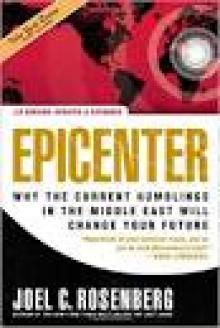 Epicenter 2.0
Epicenter 2.0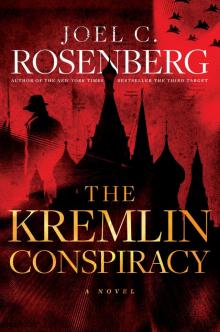 The Kremlin Conspiracy
The Kremlin Conspiracy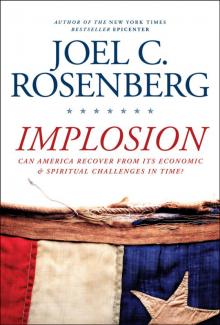 Implosion: Can America Recover From Its Economic and Spiritual Challenges in Time?
Implosion: Can America Recover From Its Economic and Spiritual Challenges in Time?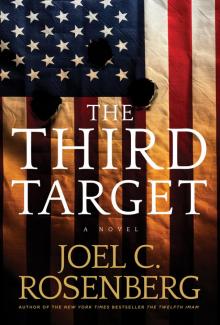 The Third Target: A J. B. Collins Novel
The Third Target: A J. B. Collins Novel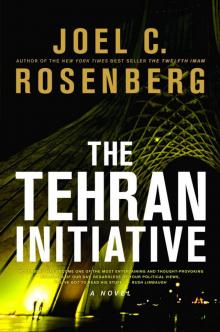 The Tehran Initiative
The Tehran Initiative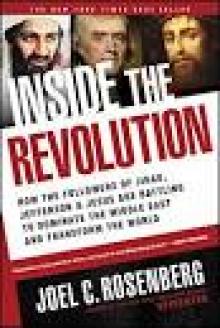 Inside the Revolution
Inside the Revolution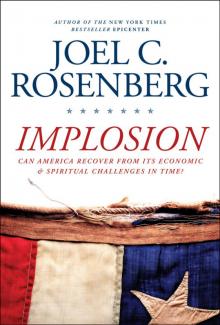 Implosion
Implosion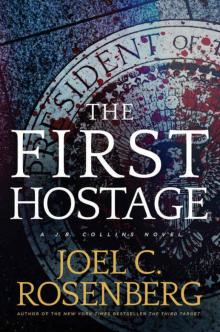 The First Hostage: A J. B. Collins Novel
The First Hostage: A J. B. Collins Novel